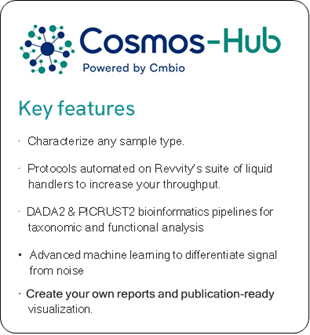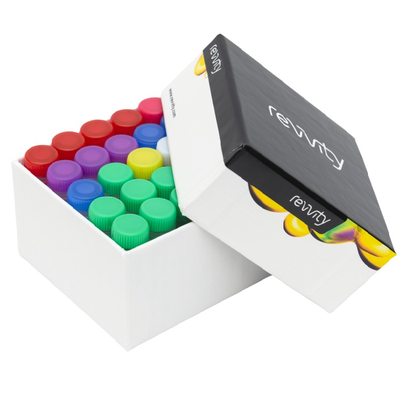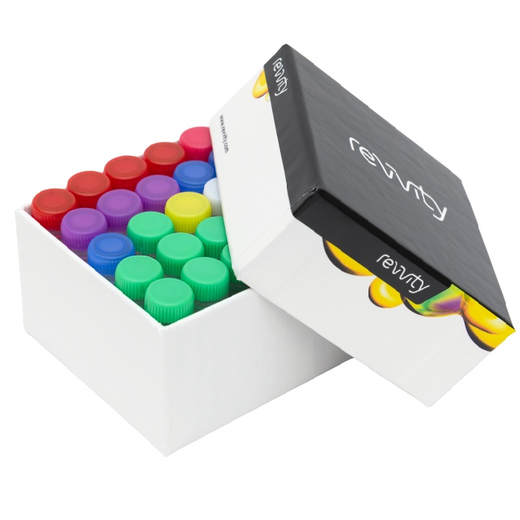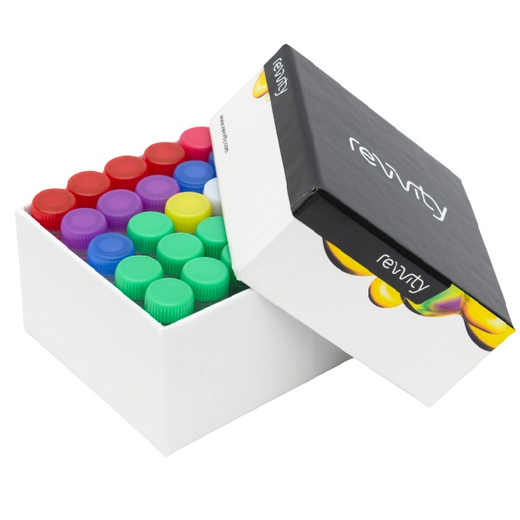

NEXTFLEX 16S V1-V3 rRNA Amplicon-seq Kits, Barcodes 97-192



The NEXTFLEX™ 16S V1–V3 Amplicon-Seq Kit enables microbial profiling by targeting the V1–V3 hypervariable regions of the 16S rRNA gene. It features a simple two-PCR workflow which includes cleanup beads and supports 1–50 ng DNA input. Libraries are compatible with 2×300 paired-end runs on Illumina® and Element® platforms and do not require custom sequencing primers.
The primer set used for amplification is based on established sequences (e.g., 27F/534R) with proprietary modifications to broaden coverage. 16S V1–V3 rRNA analysis is often chosen for its higher resolution in specific clades and compatibility with legacy protocols in longitudinal or consortium-driven studies.
384 Barcoded PCR II primers support flexible multiplexing, and product variants with “S” in their SKU number, include Cosmos-Hub® access for DADA2-based analysis with SILVA taxonomy.
Automation protocols are available for Sciclone™ liquid handlers.
| Feature | Specification |
|---|---|
| Automation Compatible | Yes |
| Product Group | 16Sアンプリコンシーケンス |
The NEXTFLEX™ 16S V1–V3 Amplicon-Seq Kit enables microbial profiling by targeting the V1–V3 hypervariable regions of the 16S rRNA gene. It features a simple two-PCR workflow which includes cleanup beads and supports 1–50 ng DNA input. Libraries are compatible with 2×300 paired-end runs on Illumina® and Element® platforms and do not require custom sequencing primers.
The primer set used for amplification is based on established sequences (e.g., 27F/534R) with proprietary modifications to broaden coverage. 16S V1–V3 rRNA analysis is often chosen for its higher resolution in specific clades and compatibility with legacy protocols in longitudinal or consortium-driven studies.
384 Barcoded PCR II primers support flexible multiplexing, and product variants with “S” in their SKU number, include Cosmos-Hub® access for DADA2-based analysis with SILVA taxonomy.
Automation protocols are available for Sciclone™ liquid handlers.



Product information
Overview
The NEXTFLEX 16S V1–V3 Amplicon-Seq Kit delivers reliable microbial community profiling from a region preferred in many clinical research, environmental, and legacy workflows. Its robust two-step design, flexible indexing, and analysis-ready outputs streamline library prep and hand off cleanly to Cosmos-Hub or your existing 16S analysis pipeline.
- Broad profiling: Amplifies the V1–V3 hypervariable regions for comprehensive bacterial coverage with strong clade-level resolution
- Straightforward workflow: Two PCR steps with minimal cleanups, custom sequencing primers are not needed
- Beads included: NEXTFLEX NGS Cleanup Beads are supplied for both cleanups
- Flexible input: Validated for 1–50 ng DNA to accommodate variable sample quality
- Scalable multiplexing: Indexing sets are available for projects ranging from small pilot studies to large-scale surveys, with up to 384 unique PCR II barcodes
- Automated options: Compatible with Sciclone NGS and NGSx workstations
- Built-in analysis: product variants with “S” in their SKU number include Cosmos-Hub® access for DADA2-based ASV analysis with SILVA taxonomy
Additional product information
Streamlined 16S V1–V3 workflow, cleanup beads included, and flexible multiplexing
The kit follows a two-step PCR design: PCR I amplifies the V1–V3 region from genomic DNA, followed by a bead cleanup to remove excess primers and short fragments. PCR II adds barcoded PCR II primers for indexing, with a final cleanup step before pooling. NEXTFLEXNGS Cleanup Beads are supplied with the kit. This helps reduce variability and avoids separate consumables purchase.
The NEXTFLEX 16S V1–V3 Kit supports multiplexing of up to 384 samples, helping reduce per-sample sequencing costs. Barcodes are available in sets of 12, 48, or 96, each supplied with two reactions per index to support projects of any scale.
Confident V1–V3 taxonomic resolution with flexible input and quality-aware outputs
Paired-end 2×300 sequencing spans the full V1–V3 amplicon (~500–580 bp), with overlapping forward and reverse reads that support read merging, chimera removal, and model-based error correction. This improves your ability to distinguish between closely related taxa and helps reduce classification errors.
Accurate taxonomic calls are essential for interpreting microbiome data, whether analyzing community structure, relative abundance, or shifts across study conditions. Using amplicon sequence variants (ASVs) instead of broad operational taxonomic units (OTUs) enables higher resolution and comparability, which is valuable in longitudinal studies, method validation, and standardized pipelines.
The protocol supports 1–50 ng DNA input, so most extraction methods yield sufficient material without additional concentration steps. Cycle number guidance is included to adjust amplification for different input levels, helping maintain consistent results while minimizing over-amplification artifacts.
Unsure whether 16S or shotgun metagenomics is right for your study? Explore a brief comparison highlighting key differences and use cases.
Cosmos-Hub 16S analysis (included with "S" variants)
Product variants with an "S" in the SKU number include access to Cosmos-Hub®, an online platform for streamlined 16S analysis. This tool processes your V1–V3 FASTQ files through a standardized, version-controlled DADA2 workflow with SILVA taxonomy, producing a quality-filtered ASV table along with clear QC summaries and interactive visualizations.
Built-in comparative tools include tables, heatmaps, bar and stacked plots, alpha and beta diversity metrics, abundance distributions, differential abundance testing, and statistical comparisons between groups. Results export as tab-separated files and PDFs, with each chart available for download in PNG or SVG formats for easy integration into downstream analysis or reports. Learn more about Cosmos-Hub.


Revvity 16S rRNA analysis - schedule a live demo
Interested in seeing Cosmos-Hub® in action? Book a one-on-one 30-minute online demonstration to explore how this analysis platform works with the NEXTFLEX 16S rRNA Amplicon-Seq Kits. You’ll get a guided walkthrough of the workflow, results, and visualization tools, plus a chance to ask questions tailored to your study.
Automation-ready
Validated scripts are available for the Sciclone NGS and NGSx platforms, including the G3 NGSx iQ® system, which enables walkaway 96-well library prep with built-in thermocycling. These automation protocols help standardize results, reduce hands-on time, and support higher-throughput workflows using the same validated kit chemistry.
Choose the 16S rRNA region that fits your study
Revvity offers 16S amplicon kits for V1–V3, V3–V4, and V4 regions, allowing you to align region selection with your research goals. Use V1–V3 when your study or standard operating procedures prioritize this region for its enhanced resolution in specific clades. Choose V3–V4 when you want broader coverage across two hypervariable domains, or go with V4 for a shorter, well-established insert compatible with legacy datasets and widely adopted protocols.
Specifications
| Analysis |
Included
|
|---|---|
| Automation Compatible |
Yes
|
| Barcodes |
97 - 192
|
| Product Group |
16S amplicon-seq
|
| Shipping Conditions |
Shipped in Dry Ice
|
| Unit Size |
192 rxns
|
Citations
Human cohort and clinical studies
L’Heureux, J. E., Corbett, A., Ballard, C., et al. (2025). Oral microbiome and nitric oxide biomarkers in older individuals with APOE4 genotype and mild cognitive impairment. PNAS Nexus. https://doi.org/10.1093/pnasnexus/pgae543
Vanhatalo, A., Curtis, K. J., Littlewood, J., et al. (2021). Network analysis of the nitrate-sensitive oral microbiome reveals interactions with cognitive and cardiovascular health. Redox Biology. https://doi.org/10.1016/j.redox.2021.101933
Cato, L. E., McKay, A. K. A., L’Heureux, J. E., et al. (2023). Low-carbohydrate, high-fat diet alters the oral microbiome without negating the nitrite response to beetroot juice. Nutrients. https://doi.org/10.3390/nu15245123
Yegorov, S., Babenko, D., Kozhakhmetov, S., et al. (2020). Psoriasis is associated with elevated gut IL-1α and intestinal microbiome alterations. Frontiers in Immunology. https://doi.org/10.3389/fimmu.2020.571319
Mechanistic and preclinical studies
Roje, B., Casemiro, S., Watson, J. F., et al. (2024). Gut microbiota carcinogen metabolism causes distal tissue tumours. Nature. https://doi.org/10.1038/s41586-024-07754-w
Quereda, J. J., Dussurget, O., Nahori, M.-A., et al. (2016). Bacteriocin from epidemic Listeria strains alters the host intestinal microbiota to favor infection. Proceedings of the National Academy of Sciences. https://doi.org/10.1073/pnas.1523899113
FAQs
-
What sequencing platforms and read lengths are supported?
-
What input DNA range is recommended?
-
Are cleanup beads included?
-
How many samples can I multiplex?
-
Which primers are used to target V1–V3?
-
Why is V1–V3 a good choice?
-
What is the typical amplicon size and why does overlap matter?
-
Can I analyze data without Cosmos-Hub?
-
Does the kit detect Archaea?
-
Which sample types are supported?
Resources
Are you looking for resources, click on the resource type to explore further.
The success of sensitive downstream genomic applications such as qPCR depend on robust and reliable upstream sample preparation...
This flyer showcases Revvity's metagenomic portfolio as well as Cosmos-Hub award winning analysis solution.
Metagenomics holds tremendous promise, yet it is not without its constraints, especially when it comes to the scarcity of powerful...
This excel sheet contains the indices used in our NEXTFLEX 16S Kits.
This flyer provides guidance on which NEXTFLEX metagenomic kit to use for microbial community profiling projects


How can we help you?
We are here to answer your questions.






























